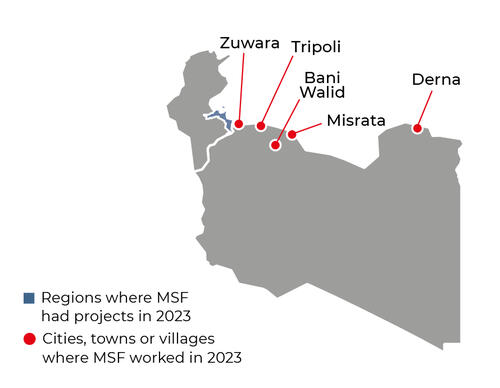In western Libya, our teams offered medical and mental healthcare to people living in vulnerable circumstances, in particular migrants, refugees and asylum seekers, who otherwise have no access to medical services. In Zuwara, our activities included general healthcare, gynaecological consultations and mental health support for both Libyan and non-Libyan patients. In Misrata, our teams conducted medical consultations in a prison and organised referrals for detainees requiring specialist treatment.
In the capital, Tripoli, our teams provided general healthcare, mental health support, and sexual and reproductive health services to migrants, refugees and asylum seekers held in detention centres. We continued to witness and hear accounts of people being assaulted, sexually abused, beaten, killed and systematically deprived of their most basic human rights, including proper access to food, water, sanitation and medical care, inside these facilities. Additionally, people told our staff about practices of forced labour, kidnapping, human trafficking, extortion and other human rights abuses in Libya.
Tuberculosis (TB) remained another focus of our activities in Libya in 2023. We continued to support the Ministry of Health TB unit in Zuwara and the isolation unit for the treatment of multidrug-resistant TB in Misrata chest hospital.
Throughout 2023, our teams were repeatedly denied entry to Tripoli detention centres, and eventually lost access completely by August. By late August, we ended medical activities in Tripoli detention centres and urban settings. We also ended our support to the National Programme on Tuberculosis and at Abu-Setta hospital for respiratory diseases by the end of 2023.
In September, severe flooding devastated the coastal city of Derna in eastern Libya. More than 4,000 people died in a few hours, and 8,000 were reported missing. Our teams responded to the disaster by donating medical items and conducting medical and mental health consultations through three general healthcare centres.





